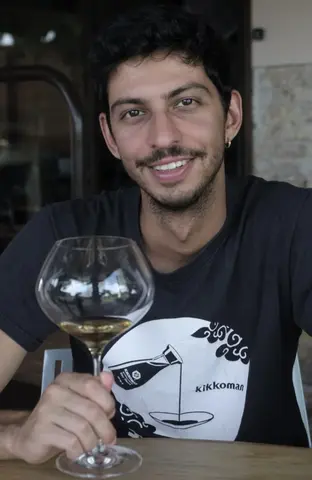Vincenzo Cerulli
vincenzo.cerulli@uni-erfurt.deDoctoral candidate (Max Weber Centre for Advanced Cultural and Social Studies)
Office hours
by arrangement
Visiting address
Campus
Max Weber Centre for Advanced Cultural and Social Studies
C19 – research building "Weltbeziehungen"
Max-Weber-Allee 3
99089 Erfurt
Mailing address
Universität Erfurt
Max Weber Centre for Advanced Cultural and Social Studies
Postfach 90 02 21
99105 Erfurt

Personal Information
2015 – 2018: Bachelor of Arts in Philosophy at La Sapienza Università di Roma
2018 – 2019: Civil Service at La casa dei diritti sociali (Tivoli)
2019 – 2022: Master of Arts in Philosophy / Double degree programm between La Sapienza Università di Roma and the Friedrich Schiller Universität Jena (Deutscher Idealismus und moderne europäische Philosophie)
From October 2023: PhD student at the Max Weber Kolleg - Universität Erfurt (IGS - Resonant Self-World Relations in Ancient and Modern Socio-Religious Practices)
From October 2024 to September 2025: PhD researcher in cotutelle at the University of Graz (Austria) – Department of Sociology
Research Project
Working title: Resonance Praxis in Filmmaking and Film Editing
Publications
- Montage as a Space for Resonance: Between Dialectical Praxis and Theoretical Tensions. (2024). PHILM. Rivista Di Filosofia E Cinema, 3, 31–49.
- En plein air filmmaking. Some notes on sea waves, wind and early cinema. (2025). PHILM: Rivista Di Filosofia E Cinema, 4, (Forthcoming)
Conferences and talks
- Self-(mediated)-World Relationship: the uncontrollable outcomes of control practices through the lens of Montage - IGS Resonant Self‐World Relations in Ancient and Modern Socio‐Religious Practices 6–8 March 2024 | Spring Conference | Max Weber Centre, Erfurt, MEDIALITY AND SELF-WORLD RELATIONS
- A contingent necessity. Rethinking the practice of filmmaking starting from Adorno and Nietzsche – XXV World Congress of Philosophy Rome 1-8 August 2024
- From potter to editor, from analogue to digital: some observations on techno-human collaboration – RAI Film Conference 2025 1-4 July 2025
- Technological Porosity: on the endless re-combinatorial possibilities of digital editing -International Walter Benjamin Society 25 “Southern Benjamin. Mourning, Play, Revolution” 17-20 September 2025 Rome
- Plasma and Negativity: towards an empirical ontology of the “outside” in creative social processes - Grasping the Social - Reconnecting Sociological Theory and Qualitative Research Joint Mid-Term Conference of the Research Networks on Social Theory and Qualitative Methods of the European Sociological Association 29th September – 1st October 2025 | University of Passau, Germany
- IGS Autumn Conference 2025 - Indifference, Hostility, Disgust: The Ambiguity of Heimat – 20-22 October 2025 Graz (Organising Committee)
Other events
- Società Italiana di Estetica - Summer School “L’estetica e i suoi classici” – 6-10 luglio 2020 Pavia
- Lisbon Praxis Summer School – Global Critical Theory – 14-18 July 2025 – Lisbon
Links
- Link to personal page on PhilPapers: https://philpeople.org/profiles/vincenzo-cerulli
- Link to personal page on Academia: https://erfurt.academia.edu/VincenzoCerulli
- Link to page on ResearchGate: https://www.researchgate.net/profile/Vincenzo-Cerulli?ev=hdr_xprf
